vncouth
uncouth -- why do these words differ with such different letters. v and u are different sounding but they are being used interchangeably. Latin origin?
vncouth
uncouth -- why do these words differ with such different letters. v and u are different sounding but they are being used interchangeably. Latin origin?
ioyous
this may be trying to say joyish but I don't understand why this is spelled with an "I"
The sayling Pine, the Cedar proud and tall, The vine-prop Elme, the Poplar neuer dry, The builder Oake, sole king of forrests all, The Aspine good for staues, the Cypresse funerall.
I admire the way nature is expressed in this book. Its beautiful but in a different way, it makes they seem like real life plants with character.
The day with cloudes was suddeine ouercast,
The storm shows some type of emotion, I definitely like this. Gives the nonliving a life as well
Too false and strong for earthly skill or might, Vnwares me wrought vnto her wicked will, And to my foe betrayd, when least I feared ill.
Usually one gets betrayed when they least expect it because if they expected it, it would not be betrayal in a sense. I hope I make sense lol
A louely Ladie rode him faire beside, Vpon a lowly Asse more white then snow, Yet she much whiter
This is interesting. Is this a common phrase that's used to compliment a lady?
For she had great doubt of his safety, Since late she saw him fall before his enemy.
It seems that she is very worried about him. Maybe this is for-shadowing something
That greatest Gloriana to him gaue, That greatest Glorious Queene of Faerie lond, To winne him worship, and her grace to haue, Which of all earthly things he most did craue;
Queen is viewed very highly
In loues and gentle iollities arrayd,
Thats a confusing line
blazon
Display prominently or vividly. In heraldry and heraldic vexillology, a blazon is a formal description of a coat of arms, flag or similar emblem, from which the reader can reconstruct the appropriate image
That huge great body, which the Gyaunt bore, Was vanisht quite, and of that monstrous mas Was nothing left, but like an emptie bladder was.
great description in this section.
Such restlesse passion did all night torment
He truly does seem very courageous because this night does infect seem like a restless night because he is trying to reach his destination without taking a break. It also seems that the story takes us on a ride with the adventure in making is seem very long, even in the style of writing it seems tiring.
guile
sly or cunning intelligence.
Arriued there they passed in forth right; For still to all the gates stood open wide, Yet charge of them was to a Porter hight Cald Maluenœ, who entrance none denide:
So they pretty much made it there but their entrance was denied? is that what's going on here. Its a bit confusing to read and understand the story so far. I'm not used to reading language like this at all.
They cannot finde that path, which first was showne, But wander too and fro in wayes vnknowne, Furthest from end then, when they neerest weene,
The language in this is right off the bat kind of weird. I don't know much about the context of this story of this particular time and author but the way that words are spelled and the way the are fragmented in the sentence are a bit odd.
intent.
I enjoyed the overall story, but the spelling of the words and syntax made it impossible to read at times. I often found myself reading entire stanzas and having to reread because I couldn't pick up a single idea. Like others have said, from other sources I know the story is full of metaphors and allegories, but I think I would need a lot more time to closely read and fully comprehend the story. The first half was insanely confusing when everyone disguised themselves as somebody else, but I eventually recovered my bearings near the end of that section. Some of the characters representing virtues reminded me a lot of Everyman, which I did enjoy. It's interesting how the author portrays each of these virtues and has their actions parallel real-life. Not my favorite reading so far, but props to the author for telling such a complex story.
There did I find, or rather I was found Of this false woman, that Fidessa hight, Fidessa hight the falsest Dame on ground, Most false Duessa, royall richly dight,
Redcrosse argues he is not betrothed to Fidessa because she was a fake.
His blazing eyes, like two bright shining shields, Did burne with wrath, and sparkled liuing fyre; As two broad Beacons,
The author uses similes to compare the dragon's body parts to human objects, so we have a reference for what the dragon looks like.
Dame Cælia men did her call, as thought From heauen to come, or thither to arise, The mother of three daughters, well vpbrought In goodly thewes, and godly exercise: The eldest two most sober, chast, and wise, Fidelia and Speranza virgins were, Though spousd, yet wanting wedlocks solemnize; But faire Charissa to a louely fere
Caelia - Heavenly, Fidelia - Faithful, Speranza - Hope, Charissa - Grace; These virtues can help pull someone out of despair.
And all the day in doing good and godly deedes.
Una brings Redcrosse to the House of Holiness to pull him out of despair. A metaphor for how trusting in God and having faith can save you from despair.
Arise, Sir knight arise, and leaue this cursed place.
Una proves to be Redcrosse's saving grace, as she both literally and figuratively pulls him out of the cave of despair. This shows how much Redcrosse means to Una (and vice versa) and how she can pull him out of the darkest places.
From that day forth Duessa was his deare
Duessa stopped the Giant from killing Redcrosse, so now he loves her.
Of murdred men which therein strowed lay, Without remorse, or decent funerall: Which all through that great Princesse pride did fall And came to shamefull end. And them beside
Thousands of bodies of men who fell to Pride.
There was Ixion turned on a wheele, For daring tempt the Queene of heauen to sin; And Sisyphus an huge round stone did reele Against an hill, ne might from labour lin; There thirstie Tantalus hong by the chin; And Tityus fed a vulture on his maw; Typhoeus ioynts were stretched on a gin, Theseus condemned to endlesse slouth by law, And fifty sisters water in leake vessels draw.
Famous characters in Greek mythology that are trapped in the Underworld.
When two of three her Nephews are so fowle forlorne?
So are the Sans brothers Duessa's nephews?
And Phoebus fresh, as bridegrome to his mate, Came dauncing forth, shaking his deawie haire: And hurld his glistring beames through gloomy aire.
Phoebus' (Apollo) movements represent the sun rising since he is the God of the Sun.
But this was drawne of six vnequall beasts, On which her six sage Counsellours did ryde,
Possibly representing the deadly sins?
It was a goodly heape for to behould, And spake the praises of the workmans wit; But full great pittie, that so faire a mould Did on so weake foundation euer sit: For on a sandie hill, that still did flit, And fall away, it mounted was full hie, That euery breath of heauen shaked it: And all the hinder parts, that few could spie, Were ruinous and old, but painted cunningly.
The Palace metaphor for the virtue of Pride, which seems strong and courageous at first glance, but is built on insecurity and false appearances.
And on his shield Sans loy in bloudie lines was dyde. When nigh he drew vnto this gentle payre And saw the Red-crosse, which the knight did beare,
Sans loy thinks the knight is actually Redcrosse, so he wants to avenge his brother.
And weeping said, Ah my long lacked Lord, Where haue ye bene thus long out of my sight?
Not the real Redcrosse Instead, it is Archimago in disguise.
All night she thinks too long, and often lookes for light.
She's stays awake thinking of her night, and searches for a sliver of hope that he will return.
Then turning to his Lady, dead with feare her found.
Is Fidessa dead?
With whom as once I rode accompanyde, Me chaunced of a knight encountred bee, That had a like faire Lady by his syde, Like a faire Lady, but did fowle Duessa hyde.
Suspiciously sounds like the Knight's previous encounter... I'm predicting Fidessa is Duessa in disguise.
The Lady when she saw her champion fall, Like the old ruines of a broken towre,
The author uses a simile to compare the Knight falling to an old tower. Once high and mighty, but now weak and destroyed.
He saw diuided into double parts,
Archimago divided Una and her Knight so they would be easier targets.
Like a young Squire, in loues and lusty-hed
The sorcerer turned another spright into a Squire to lie with the fake Una and trick the Knight
With that misformed spright he backe returnd againe.
The Knight did not fall for the trick and went back to sleep.
Errours
Is this supposed to be Error? Like a figurative representation?
The sayling Pine, the Cedar proud and tall, The vine-prop Elme, the Poplar neuer dry, The builder Oake, sole king of forrests all, The Aspine good for staues, the Cypresse funerall. The Laurell, meed of mightie Conquerours And Poets sage, the Firre that weepeth still, The Willow worne of forlorne Paramours, The Eugh obedient to the benders will, The Birch for shaftes, the Sallow for the mill, The Mirrhe sweete bleeding in the bitter wound, The warlike Beech, the Ash for nothing ill, The fruitfull Oliue, and the Platane round, The caruer Holme, the Maple seeldom inward sound.
The author uses the appearance of the trees to create personalities for each of them.
.
I am rather disappointed with this. From what I understand through outside resources, the story is amazing and full of deeper meanings, allegories. However, in reading it myself, I really could not understand it due to the spellings, strange syntax, and incredibly obscure, at times, allegories. I was hoping to enjoy reading this as much as some of the other readings, but it was just impossible.
.
It's an allegory, so everything in this story seems very black-and-white. Characters are flat and don't change much. As they represent qualities and symbols, they can't really undergo a lot of changes. This, in my opinion, makes the story less interesting. But well, this is the poet's intention to "fashion a gentleman," so I guess he's done a good job in educating readers about morality and ethics. Is it a fun read? Well, each canto has a bit of actions, so I guess it's not too boring. Is it an easy read? Definitely not, especially in the beginning when I'm still thinking if it's the editor's fault not to correct the spellings of some words (just kidding, I understand Spenser's language is deliberately kept archaic.)
auenging
I tried Googling this word for a definition and all I could find was a word unscrambler...
benumbd
Benumbed: deprive of physical or emotional feeling.
Styx
I am assuming this is referring to the rive Styx. If so, how does a river fly?
Aegyptian
Egyptian? It would make sense. I just dont know why the spelling is so strange.
Her vomit full of bookes and papers was, With loathly frogs and toades, which eyes did lacke,
... What? I have never heard of this diet before... Do you have to remove the eyes from the frogs and toads or are you supposed to find ones already missing eyes? Honestly, I am so lost. I have no idea what is going on, and finally a line I do understand and it makes no sense.
vncouth
Uncouth. It means something along the lines of unkept, unclean, or disorganized.
I am noticing that a lot of the "u"'s in this are replaced with "v"'s and I am not sure why.
A ramping Lyon rushed suddainly, Hunting full greedie after saluage blood; Soone as the royall virgin he did spy, With gaping mouth at her ran greedily, To haue attonce deuour’d her tender corse: But to the pray when as he drew more ny, His bloudie rage asswaged with remorse, And with the sight amazd, forgat his furious forse.
Una and the lion
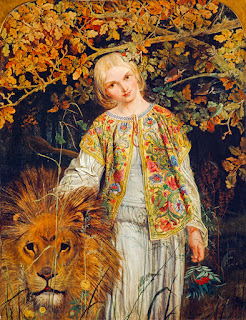
Faire Vna to the Redcrosse knight betrouthed is with ioy:

Soone as the terme of those six yeares shall cease, Ye then shall hither backe returne againe, The marriage to accomplish vowd betwixt you twain.
Ok so the Red Cross Knight can marry Una after six years.
rue
like a regret.
vndeserued
Is this understood?
blazon
To display proudly and prominently.
In which him chaunced false Duessa meete, Mine onely foe, mine onely deadly dread, Who with her witchcraft and misseeming sweete, Inueigled him to follow her desires vnmeete.
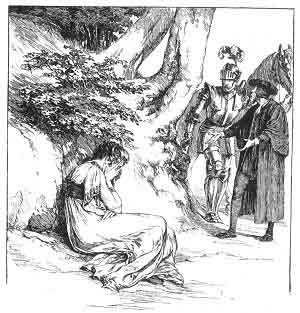
At last she chaunced by good hap to meet A goodly knight, faire marching by the way Together with his Squire, arayed meet
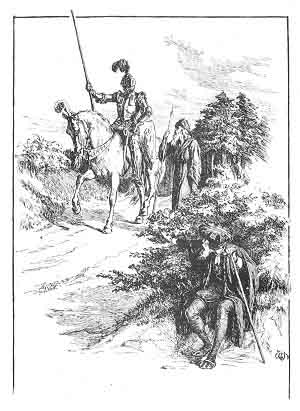
And to the knight his daughter deare he tyde, With sacred rites and vowes for euer to abyde. His owne two hands the holy knots did knit, That none but death for euer can deuide
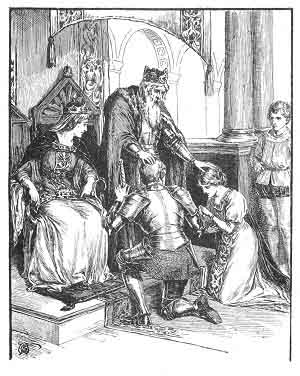
From thence, far off he vnto him did shew A litle path, that was both steepe and long, Which to a goodly Citie led his vew; Whose wals and towres were builded high and strong Of perle and precious stone, that earthly tong Cannot describe, nor wit of man can tell
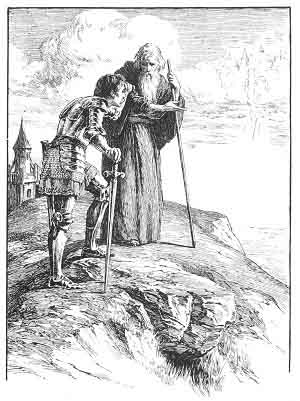
The knight and Vna entring, faire her greet, And bid her ioy of that her happie brood; Who them requites with court’sies seeming meet, And entertaines with friendly chearefull mood.
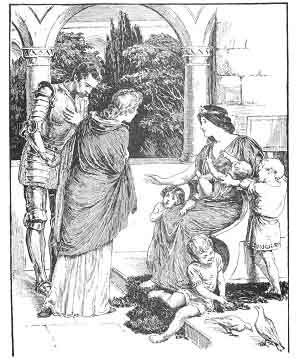
Ere long they come, where that same wicked wight His dwelling has, low in an hollow caue, Farre vnderneath a craggie clift ypight, Darke, dolefull, drearie, like a greedie graue, That still for carrion carcases doth craue
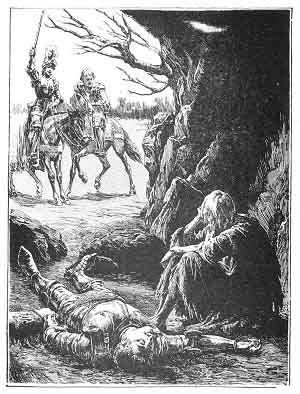
So as they traueild, lo they gan espy An armed knight towards them gallop fast, That seemed from some feared foe to fly, Or other griesly thing, that him agast.
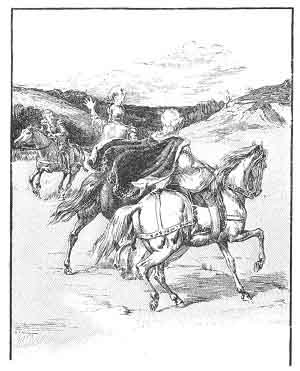
Whom when his Lady saw, to him she ran With hasty ioy: to see him made her glad, And sad to view his visage pale and wan
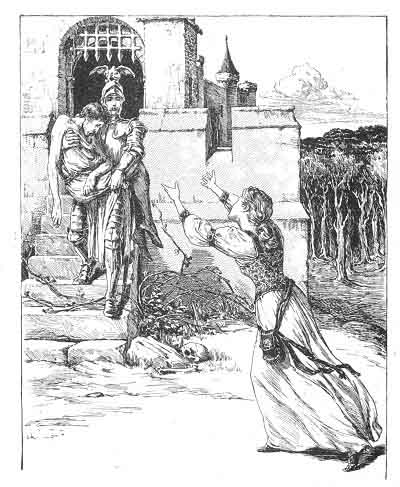
The knight approching nigh, of him inquerd Tydings of warre, and of aduentures new
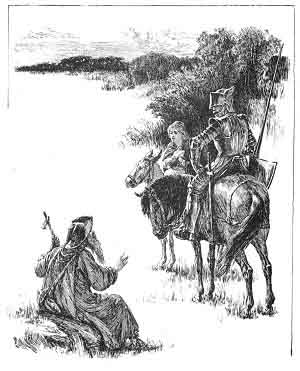
Lo vnderneath her scornefull feete, was layne A dreadfull Dragon with an hideous trayne, And in her hand she held a mirrhour bright, Wherein her face she often vewed fayne, And in her selfe-lou’d semblance tooke delight
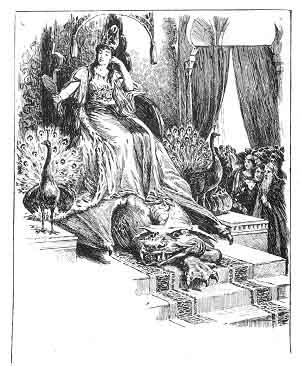
But this was drawne of six vnequall beasts, On which her six sage Counsellours did ryde,
Her carriage is pulled by six beasts on which her six advisors ride.
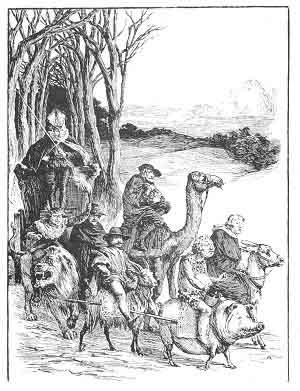
And proud Lucifera men did her call, That made her selfe a Queene, and crownd to be, Yet rightfull kingdome she had none at all,
She's made herself a queen, even though she isn't royal by birth and doesn't actually own any territory.
Her seeming dead he found with feigned feare, As all vnweeting of that well she knew, And paynd himselfe with busie care to reare Her out of carelesse swowne. Her eylids blew And dimmed sight with pale and deadly hew At last she vp gan lift: with trembling cheare Her vp he tooke, too simple and too trew, And oft her kist. At length all passed feare, He set her on her steede, and forward forth did beare.
They had sex?
Who whiles he liu’de, was called proud Sans foy, The eldest of three brethren, all three bred Of one bad sire, whose youngest is Sans ioy, And twixt them both was borne the bloudy bold Sans loy.
So his name is Sans foy, the eldest, the youngest is named Sans joy, and the middle brother is named Sans loy.
Borne the sole daughter of an Emperour, He that the wide West vnder his rule has, And high hath set his throne, where Tiberis doth pas. He in the first flowre of my freshest age, Betrothed me vnto the onely haire Of a most mighty king, most rich and sage; Was neuer Prince so faithfull and so faire, Was neuer Prince so meeke and debonaire; But ere my hoped day of spousall shone, My dearest Lord fell from high honours staire, Into the hands of his accursed fone, And cruelly was slaine, that shall I euer mone.
She says she's the daughter of an Emperor and that she's engaged to a prince but he died.
He then deuisde himselfe how to disguise; For by his mightie science he could take As many formes and shapes in seeming wise, As euer Proteus to himselfe could make: Sometime a fowle, sometime a fish in lake, Now like a foxe, now like a dragon fell, That of himselfe he oft for feare would quake, And oft would flie away. O who can tell The hidden power of herbes, and might of Magicke spell?
Archimago disguise himself as the Red Cross Knight! Oh my!
And after him she rode with so much speede As her slow beast could make; but all in vaine
They probably can't catch the Red Cross Knight and her drawf as they're too slow.
All in amaze he suddenly vp start With sword in hand, and with the old man went; Who soone him brought into a secret part, Where that false couple were full closely ment In wanton lust and lewd embracement: Which when he saw, he burnt with gealous fire, The eye of reason was with rage yblent, And would haue slaine them in his furious ire, But hardly was restreined of that aged sire.
The Red Cross Knight is mad and follows the magician to see "Una" sleeping with someone else. He wants to kill "that guy."
Forthwith he runnes with feigned faithfull hast Vnto his guest, who after troublous sights And dreames, gan now to take more sound repast, Whom suddenly he wakes with fearefull frights, As one aghast with feends or damned sprights, And to him cals, Rise rise vnhappy Swaine, That here wex old in sleepe, whiles wicked wights Haue knit themselues in Venus shamefull chaine; Come see, where your false Lady doth her honour staine.
Archimago decides to make one of his other spirits look like a young knight, and has the spirit that looks like Una get in bed with him.
In loues and gentle iollities arrayd,
What does this mean?
KNIGHT OF THE RED CROSSE
aka. The Red Cross Knight, aka. St. George, the patron saint of England, who stands for the virtue of Holiness.
turnd
returned
to you bound
correcting her address to him as her "liege Lord"
beguiled of her art
being disappointed in her intent; or deprived of her cunning
appease
ceased, as though satisfied
procure
cause
irkesome
tired; also troublesome
vnknowne
unknown to her, but suggesting that he is unknown and unproven, and hence unworthy to be her lover
disdainefull spight
indignant contempt
redoubted
dreaded
deare
dire, but also the usual sense because of her love
frayes
frightens
languor
woeful plight, sorrow
rew
feel sorry for
Die is my dew
I deserve to die.
amate
dismay
that false winged boy
Cupid
the blind God
Cupid, "that false winged boy"
Tho can
then did
despight
indignation
vncouth
strange; unseemly
seruice
as the "servant" of love
toy
lustful play
Dame pleasures
Venus
vsage sly
refers to the cunning behavior by which she imitates Una
hew
shape, appearance
In sort as
in the way that
ydle
empty
Vna
The Lady is named only now, aka. Una.
sent
senses
fancies
fantasies
dryer
too dry
paine
effort
rudely
roughly
swowne
an earlier spelling of "swoon"
doth steepe
continually bathes
Cynthia
goddess of the moon; refers to the moon here
euer damned
eternally damned
Cocytus
the river of lamentation in Hades
quakes
because even wailing ceases
sad humour
heavy moisture
For that old man of pleasing wordes had store, And well could file his tongue as smooth as glas; He told of Saintes and Popes, and euermore He strowd an Aue-Mary after and before.
Is the old man a magician or something?
the twelve private morall vertues, as Aristotle hath devised
Courage, Temperance, Liberality, Magnificence, Pride, Honor, Good Temper, Friendliness, Truthfulness, Wit, Friendship, and Justice
William Shakespeare

And for they looked but with divining eyes, They had not skill enough your worth to sing: For we, which now behold these present days, Have eyes to wonder, but lack tongues to praise
Wow... this one is even sweeter than 105. He is saying all the descriptions about beauty in the past are all anticipating his beloved. And, they were not good enough to depict your worth. Those who live in the present time are able to be overwhelmed by your beauty but don’t have the skill to describe it. Shakespeare really knows how to please his lover. lol
wasted time
Time past
Fair, kind, and true, have often liv’d alone, Which three till now, never kept seat in one.
Beauty, kindness and faithfulness are often found separately and have never been found in one person until now... so sweet!
Like widow’d wombs after their lords’ decease
Is he saying the time they'd be apart is like a widow giving birth after her husband died? What does that mean?
!
umm.. I like this one. The poet sounds so jealous and bitter. He is complaining his beloved's heart is somewhere else and her looks would never show anything but sweetness.
How like Eve’s apple doth thy beauty grow, If thy sweet virtue answer not thy show!
Your beauty becomes much like Eve’s apple when you’re not as sweet and virtuous as you look.
true
faithful
Thus have I had thee, as a dream doth flatter, In sleep a king, but waking no such matter.
The time in which I had you was like a flattering dream; while I was asleep, I thought I was a king, but when I woke up, I found that was not the case.
others, for the breath of words respect, Me for my dumb thoughts, speaking in effect
Respect others for their spoken words and me for my unspoken thoughts, that speak only through their actions.
The humble as the proudest sail doth bear
Your worth can bear both the humble and proud sail.
might
energy
Without all bail
Accepting no bail
none
winter
yellow leaves
autumn comes
on the ashes of his youth doth lie
the fire of life is dying; only embers remain on ashes
Death’s second self
A metaphor for night
behold
notice
But let your love even with my life decay; Lest the wise world should look into your moan, And mock you with me after I am gone.
A bit sarcastic here... let your love decay, just as I decay, let the world mock you for hanging onto the memory of me.
fled
dead
When I perhaps compounded am with clay, Do not so much as my poor name rehearse
The tone for this one is so melancholy... When my body has become mixed with the dust and dirt, Do not even mention my insignificant name.
Time’s best jewel
symbolizes beauty of youth
Since brass, nor stone, nor earth, nor boundless sea, But sad mortality o’ersways their power, How with this rage shall beauty hold a plea, Whose action is no stronger than a flower? O! how shall summer’s honey breath hold out, Against the wrackful siege of battering days, When rocks impregnable are not so stout, Nor gates of steel so strong but Time decays?
Time is Shakespeare's greatest enemy lol
impregnable
strong; invulnerable
iniquity
crimes; evil
And for myself mine own worth do define, As I all other in all worths surmount.
I regard myself as surpassing everyone else in everything.
glass
mirror
It is so grounded inward in my heart
The sin is so deeply rooted in my heart.
Sin of self-love possesseth all mine eye And all my soul
The sin of self-love controls everything I see, and my entire soul.
my verse shall stand. Praising thy worth, despite his cruel hand
My verses will last into the future, praising your worth despite Time’s cruel hand--Yes! And we're still reading Shakespearean sonnets after more than 400 years! He's a prophet.
rarities
valuable (because they are so rare)
And Time that gave doth now his gift confound.
Time, which gives everything, now destroys its own gift.
posterity
future generations
broils
riots or violent quarrels
Excusing thy sins more than thy sins are
Excusing your sins and even sins you haven't committed
Such civil war is in my love and hate
I love this line. He is so torn apart by loving and hating someone at the same time.
Myself corrupting, salving thy amiss
by smoothing over your wrongs I corrupt myself
Authorizing thy trespass with compare
sanctioning your sins by these comparisons
Full many a glorious morning have I seen Flatter the mountain tops with sovereign eye, Kissing with golden face the meadows green, Gilding pale streams with heavenly alchemy

But out! alack! he was but one hour mine,
But, alas, my sun was mine for only an hour
Flatter the mountain tops with sovereign eye
The sun here is compared to a king.
But if the while I think on thee, dear friend, All losses are restor’d and sorrows end.
But if I think of you while I am in this state of sadness, dear friend, All my losses are compensated for and my sorrow ends.
weep afresh love’s long since cancell’d woe
cry again over woes that were long since healed
For thy sweet love remember’d such wealth brings That then I scorn to change my state with kings.
For thinking of your love brings such happiness that then I would not change my position in life with kings.
Haply
by chance
Yet in these thoughts my self almost despising
But, with these thoughts – almost despising myself
With what I most enjoy contented least
I am least contented with what I used to enjoy most
look upon myself
I become occupied with self-reflection.
beweep
weep over
As an unperfect actor on the stage, Who with his fear is put beside his part
He is comparing himself to an actor with stage fright as he isn't brave enough to tell his lover he loves him/her.
perfect ceremony
the full and due expression of love
Till Nature, as she wrought thee, fell a-doting, And by addition me of thee defeated, By adding one thing to my purpose nothing. But since she prick’d thee out for women’s pleasure, Mine be thy love and thy love’s use their treasure.
Seems to be saying that despite his love for the young man, Shakespeare doesn't want to have him physically, and he is satisfied with spiritual love with the guy. Probably he can't come out of the closet at that time...
master mistress
male-mistress... I think this sonnet (and probably the others praising youth beauty) has caused much debate over Shakespeare's sexuality.
Him in thy course untainted do allow For beauty’s pattern to succeeding men.
Allow him to remain youthful, and remain the very ideal of beauty for people to admire.
I forbid thee one most heinous crime: O! carve not with thy hours my love’s fair brow
Aww this is sweet.. he's asking time not to make any mark on his lover's brow.
sweets
pleasures
fleets
fly by
phoenix
the mythological eagle-like bird associated with Egyptian sun-worship, had a life span of more than 500 years.
keen
sharp
brood
children
So long as men can breathe, or eyes can see, So long lives this, and this gives life to thee.
So long as there are people on this earth, So long will this poem live on, making you immortal.
temperate
evenly-tempered
And all in war with Time for love of you, As he takes from you, I engraft you new
This is lovely... Because I love you I declare war against Time, and as he takes from you, I renew your life.
To change your day of youth to sullied night
To change brightness of your youth to the dark night of old age
wasteful Time debateth with decay
the destroyer Time fights against Decay
this huge stage
A metaphor for the world
contracted to
bound only to
we desire increase
we want offspring
remember’d not to be
simply to be forgotten
beguile
cheat
And summer’s green all girded up in sheaves, Borne on the bier with white and bristly beard,
The crops are personified as the body of an old man, carried on a wagon to church, wrapped tightly in his shroud, with his white beard.
summer’s green
Shakespeare here uses a literary device known as synecdoche (by which a specific part is taken for the whole); thus summer's green is the bounty of crops.
erst
formerly
canopy
shelter
When I behold the violet past prime, And sable curls, all silvered o’er with white; When lofty trees I see barren of leaves, Which erst from heat did canopy the herd, And summer’s green all girded up in sheaves,
I love all the imagery with colors here.
sable
darkest brown
prime,
first hour of the day, meaning sunrise
should form another
meaning to have kids?
Look in thy glass and tell the face thou viewest Now is the time that face should form another
Whao. Is he speaking to the same person? Why he keeps asking this youth to give birth? lol
Within thine own bud buriest thy content
He's saying the youth is burying his gifts within himself.
mak’st
make
And only herald to the gaudy spring,
The speaker is praising the youth's beauty, comparing him to a messenger of spring, bringing hope and beauty to the world.
Why is “The Dark Lady” considered a woman, or could it be death?
This is a great (and tough) question. I've never thought about this!
.
What a great teaser! Thank you!